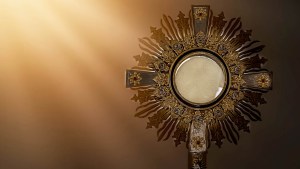In our scientific world, we often want everything verified and calculated, telling us exactly how something happens, or being able to see the mechanisms unfold before our eyes.
Unfortunately, outside of a few Eucharistic miracles, there are no visible changes to the bread and wine we see at Mass.
Even if we put a normal consecrated host under a microscope, we would not see it transformed into Jesus’ body and blood.
Our physical eyes will likely never see a difference between a consecrated host and an unconsecrated host.
How can we be certain?
Belief in the Eucharist boils down to trust in God.
The Catechism of the Catholic Church explains this in its section on the Eucharist:
“That in this sacrament are the true Body of Christ and his true Blood is something that ‘cannot be apprehended by the senses,’ says St. Thomas, ‘but only by faith, which relies on divine authority.’ For this reason, in a commentary on Luke 22:19 (‘This is my body which is given for you.’), St. Cyril says: ‘Do not doubt whether this is true, but rather receive the words of the Savior in faith, for since he is the truth, he cannot lie.‘”
CCC 1381
If we believe that Jesus is God and that he told the truth while on earth, then we are challenged to believe in the gift of the Eucharist and that he is able to miraculously transform bread and wine into his body, blood, soul and divnity.
The Catechism provides a few verses from St. Thomas’ hymn Adoro te devote as an example of the type of faith we should have:
Godhead here in hiding, whom I do adore
CCC 1381
Masked by these bare shadows, shape and nothing more,
See, Lord, at thy service low lies here a heart
Lost, all lost in wonder at the God thou art.
Seeing, touching, tasting are in thee deceived;
How says trusty hearing? that shall be believed;
What God’s Son has told me, take for truth I do;
Truth himself speaks truly or there’s nothing true.
When it comes to the Eucharist, we need both faith and reason. We cannot believe in the Eucharist through reason alone. It all comes down to faith and trusting that God did not lie to us, but is truly present in a unique and miraculous way.



